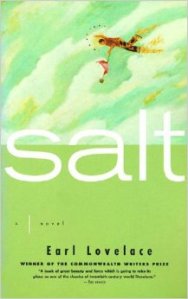Salt is about Trinidad and neo-colonial independence. Trinidad’s I million people – Africans (the descendants of slaves), Indians (the descendants of indentured labourers), Chinese, Portuguese, English, French creole and plenty others – won independence from Britain in 1962. The independence movement was led and propelled by Blackpeople (Africans).
To understand the story of neo-colonialism, its crimes and tragedies, you need to understand the older story of Africa and her diaspora, some flung away from African kingdoms and across the Atlantic as far as the Caribbean, as far as Trinidad, 19 kms off the coast of Venezuela and the Orinoco Delta. Arguably Africa is the continent that was most damaged by European colonization, a system founded on slavery and the erasure of pre-European history. All the continents on this earth, apart from Europe and central Asia, were colonized by the European elite at some point from, roughly, 1600 to 1950, but even Saint Mahatma Gandhi hated and despised Africans. The global elite has put a lot of effort into ensuring that they of all peoples, with the exception of the indigenous peoples of the Americas and Australia, are not free to use their lands and their energy as they think fit. This also applies to the people of African descent who live in the Caribbean, with the partial exception of Cuba. It explains why Haiti, the first black African country to win independence from Europe, has, since 1804, been tortured so savagely by European military power and finance that it’s now widely reckoned to be the poorest country on earth. It explains, at least partly, why the global powers’ behaviour displays spectacular fear of Africans anywhere in the world: control of the continent’s vast riches, including interest on debt, and control of African labour underpin capitalism, including the Chinese version.
What has all this to do with shiny modern Africa and the Caribbean? If you believe PR pitches on tourism, social media, mobile phones and investment opps, then nothing. If you’re interested in the truth, then everything. You’ll know global authorities lie and cover up, and that one of truth’s best friends is literature, with or without correspondence to reality.
Uncle Bango’s great great great grandfather Guinea John, after bestial reprisals against a slave revolt, travels to Trinidad’s east cost, ‘put two corn cobs under his arm pits and flew away to Africa.’ p3. Those he leaves behind berate him for taking the secrets of flight with him.
But ‘[Guinea John] loved his children. It was their living that would make him an ancestor. His wisdom was theirs to have; but they had eaten salt and made themselves too heavy to fly. … now their future would be in the islands… ‘ p1. The book is about leaving the island or not leaving the island, about escape, or not, about other worlds, the world of obeah and the African orishas, of Britain (though not a lot), the world that emancipation and then independence promised. It creates world- and heart-bestriding figures out of people educated in waiting and ‘secondclassness’, to whom it doesn’t occur ‘that this infant should believe that this world could ever belong to him.’ p9. Further along, when the National Party and the Leader, aka the PNM and Eric Williams in the 1970s, betray the people, cue for shades of Ngugi wa Thiong’o’s and the late Chinua Achebe’s masterpieces on neo-colonial betrayal. Shades also of Song of Solomon and Toni Morrison’s great poetic histories of the African diaspora in North America.
If Salt has major characters then they’re Alford George and Uncle Bango, the first a naif who doesn’t speak till he’s six, educates ‘his verbs [to be] in more frequent agreement with his subjects,’ p36, and becomes a National Party politician via carnival arts, cricket and a hunger strike for equal education. Although everyone’s more or less related – it’s a small island – Uncle Bango comes from a family which has waited since emancipation and before to claim the land the ex-slavers still own, and now he’s carrying on, he’s marching for independence, for an idea of freedom, he’s giving away money he and his family don’t have, he’s clothing a children’s marching band made up of all the races on the island, he’s marching for every event, political and religious and cultural, that the island of carnival throws up. But he doesn’t, his wife Myrtle realizes on p155, know what he’s fighting for. Certainly not for ownership of the land. Yet he’s the one that Alford, after the National Party fails him, chooses to march into the future with.
Major characters, consistent voice and register, narrative subject (as in 1st person, 2nd person, 3rd person), linear time and point of view are all conventions Lovelace gloriously chucks out and/or does exactly as he pleases with, along with facts, notorious and brilliant PM Eric Williams for one. Like Ngugi and Achebe making fiction about Kenya and Nigeria, he doesn’t give a damn how close his fictional National Party sails to the real People’s National Movement. Presumably Faber and Faber consulted their lawyer before publishing Salt in 1996, 14 years after Williams’ death.
What Lovelace does is create so many voices and registers of dialect, so many characters, points of view, so many ‘I’s and ‘he’s and ‘she’s, often grandly and shockingly swapping mid sentence between ‘I’ and ‘he’, that I felt the whole island was the narrator. To tell Trinidad’s story, not just an individual’s story is a fabulous thing: not Alford’s alone nor Bango’s, nor Myrtle’s, nor Florence’s nor the anonymous baker’s son nor any of the others. It’s taking anonymous first person narration, the presence of an invisible and slightly creepy character who’s somewhere between god and Uriah Heep, as in Dostoevsky’s The Devils, a million miles further on. First of all I tried to track the changes and identities of all the narrators, gave up, and then abandoned myself to the perfectly clear – and if not, so what – narrative positions Lovelace sets up. I always knew whose eyes I was looking through, even if I didn’t know who those eyes belonged to. A bit like a carnival mask – the eyes are ‘real’, but the face in particular and the person as a whole assumes magical properties because ‘real’ identity is absent and a fabulously wrought costume dominates the present, the practicalities of wire bending and wining notwithstanding.
So the mask allows the language freedom to relax. Excising his Caribbean dialect would ready Alford, he once thought, for escape to another world, initially Britain. His mother’s ill-health removes that possibility. Eventually he understands his task is to make the island itself into another world, a place people don’t have to leave, just as Bango, having believed in a freedom bestowed by a nature which can’t be owned, realizes that he and his people are owed, at the very least, the land they worked for centuries with less than no reward. They’re owed by the current black administration who failed, at independence, to claim the land for them. By the end of the book, the promise of harmony that Bango’s language initially makes is, you feel realizable, despite Alford and Bango having been forced apart by shame and education and access to the elite. Despite also the interests of the descendants of indentured Indians who were bribed out of British India by the promise of Caribbean land.
‘The sky, the sea, every green leaf and tangle of vines sing freedom. Birds frisk and flitter and whistle and sing. Just so a yard cock will draw up his chest and crow. Things here have their own mind. The rain decide when it going to fall.’ p5. This, in a Bango-inflected narration, is how Lovelace harmonises the many languages his characters speak, Bango’s eyes the ones ‘bathing me [Myrtle] in my own beauty.’ p138
The chapters near the end devoted to the views of Alford’s friends and supporters Sonan the Indian and Adolphe the younger son of the Carabon the white estate owner are a bit problematical, feel a bit shoehorned. Did Lovelace feel compelled to push representatives of the two other major racial groups on the island to the front of the narrative stage? OK, some Indians and some Europeans are good guys capable of throwing their lot in with the African majority, in other words. Lovelace needn’t have worried. He’s written Adolphe’s father, the old and relatively kind estate owner, and Sonan’s father Moon, the Indian store keeper, with love. He only makes characters he loves. The bigoted and cruel estate owners and slavers, the self seeking National Party leaders – the villains – aren’t individualized, described, or given direct speech, let alone a point of view or narrative voice, except, briefly, Adolphe’s brothers. Reported characters don’t take up moral space. That’s one of the beauties of the novel form. As Alford’s political agent remarks, ‘The Prime Minister say plenty things. Be careful what you hear him saying. Listen.’ p124.
Salt, a book about Trinidad, is about the whole neo-colonial African world, and about the whole African diaspora ‘thinking still of that self beyond his [Alford’s] reach in a faraway place, as a loss, as something he had been deprived of. But how do you feel the loss of a self that you did not have to lose? How can you lose an Africa you did not know? But that was what he felt: the loss of not having had that loss to lose.’ p256.

